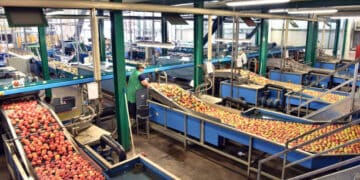Switzerland’s recent policy shift to allow tariff-free entry for all industrial goods from all countries could limit the benefits India might gain from the proposed free trade agreement (FTA) with the European Free Trade Association (EFTA), according to a report by the Global Trade Research Initiative (GTRI). This policy, effective from January 1, 2024, removes tariffs on a range of products including chemicals, consumer goods, vehicles, and clothing. Switzerland, a key export destination for India within EFTA, has made this decision, which could heighten competition for Indian products in the Swiss market, even with an FTA in place.
EFTA, comprising Iceland, Liechtenstein, Norway, and Switzerland, is an organization aimed at promoting free trade but is not part of the European Union. India’s trade with EFTA has been noteworthy, with exports during 2022-23 amounting to $1.92 billion, up from $1.74 billion in the previous fiscal year. However, imports were significantly higher, totaling $16.74 billion in the last fiscal compared to $25.5 billion in 2021-22. The GTRI report highlights that 98% of India’s $1.3 billion merchandise exports to Switzerland in FY2023 were industrial goods, now directly affected by the Swiss policy. Additionally, exporting agricultural products to Switzerland remains challenging due to stringent tariffs, quality standards, and approval processes.
The report notes that EFTA, including Switzerland, has not indicated a willingness to eliminate agriculture tariffs on most basic agricultural produce. With these barriers and zero industrial tariffs in Switzerland, India’s potential gains in merchandise exports are substantially reduced. The trade imbalance between India and Switzerland is another point of concern. In FY2023, India’s imports from Switzerland stood at $15.79 billion against exports of $1.34 billion, resulting in a significant trade deficit of $14.45 billion. A critical factor in the FTA negotiations is gold, which constitutes 80% of India’s imports from Switzerland. The inclusion of gold in the FTA is crucial for meeting the WTO Article XXIV conditions, which require duty cuts on substantial trade.
Switzerland’s position as a major gold refiner, primarily refining imported gold, poses challenges in meeting the Rules of Origin conditions for value addition. The GTRI report suggests that Switzerland may propose alternatives to value addition conditions, such as specific refining processes, and advises India to approach these negotiations with caution.
Breaking supply chain news is just a click away at The Supply Chain Report. Enhance your knowledge of international trade at ADAMftd.com with free tools.
#SwitzerlandTradePolicy #IndiaEFTA #TariffFreeTrade #GlobalTradeResearch #IndustrialGoodsExport #TradeImbalance #EFTATrade #MerchandiseExports #GoldImports #FTAChallenges
Switzerland’s recent policy shift to allow tariff-free entry for all industrial goods from all countries could limit the benefits India might gain from the proposed free trade agreement (FTA) with the European Free Trade Association (EFTA), according to a report by the Global Trade Research Initiative (GTRI). This policy, effective from January 1, 2024, removes tariffs on a range of products including chemicals, consumer goods, vehicles, and clothing. Switzerland, a key export destination for India within EFTA, has made this decision, which could heighten competition for Indian products in the Swiss market, even with an FTA in place.
EFTA, comprising Iceland, Liechtenstein, Norway, and Switzerland, is an organization aimed at promoting free trade but is not part of the European Union. India’s trade with EFTA has been noteworthy, with exports during 2022-23 amounting to $1.92 billion, up from $1.74 billion in the previous fiscal year. However, imports were significantly higher, totaling $16.74 billion in the last fiscal compared to $25.5 billion in 2021-22. The GTRI report highlights that 98% of India’s $1.3 billion merchandise exports to Switzerland in FY2023 were industrial goods, now directly affected by the Swiss policy. Additionally, exporting agricultural products to Switzerland remains challenging due to stringent tariffs, quality standards, and approval processes.
The report notes that EFTA, including Switzerland, has not indicated a willingness to eliminate agriculture tariffs on most basic agricultural produce. With these barriers and zero industrial tariffs in Switzerland, India’s potential gains in merchandise exports are substantially reduced. The trade imbalance between India and Switzerland is another point of concern. In FY2023, India’s imports from Switzerland stood at $15.79 billion against exports of $1.34 billion, resulting in a significant trade deficit of $14.45 billion. A critical factor in the FTA negotiations is gold, which constitutes 80% of India’s imports from Switzerland. The inclusion of gold in the FTA is crucial for meeting the WTO Article XXIV conditions, which require duty cuts on substantial trade.
Switzerland’s position as a major gold refiner, primarily refining imported gold, poses challenges in meeting the Rules of Origin conditions for value addition. The GTRI report suggests that Switzerland may propose alternatives to value addition conditions, such as specific refining processes, and advises India to approach these negotiations with caution.
Breaking supply chain news is just a click away at The Supply Chain Report. Enhance your knowledge of international trade at ADAMftd.com with free tools.
#SwitzerlandTradePolicy #IndiaEFTA #TariffFreeTrade #GlobalTradeResearch #IndustrialGoodsExport #TradeImbalance #EFTATrade #MerchandiseExports #GoldImports #FTAChallenges














